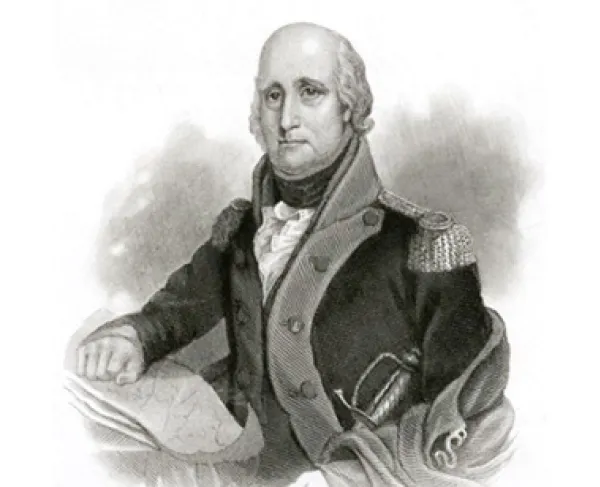George Rogers Clark

George Rogers Clark grew up on the fringes of the American frontier and his life and aspirations were intimately tied to the frontier and westward expansion. Through his military ventures, Clark would do much to expand the territorial boundaries of the United States.
Born in Albemarle County, Virginia, on November 19, 1752, Clark was a surveyor in the Kentucky territory during the American Revolution. Clark became embroiled in the conflicts between Indians and European-American settlers over land disputes, resulting from the Treaty of Fort Stanwix of 1768. Unrest finally culminated in Lord Dunmore’s War in the summer of 1774, in which Clark served as a private in the Virginia militia.
Defense of the frontier mostly fell to local men since the Continental army could not be spared from conflicts in the east. Clark took it upon himself to raise troops and organize offensive campaigns against British forts and Native villages in the Northwest Territory: a region that encompassed the future states of Ohio, Indiana, Illinois, Michigan, Wisconsin, and northeastern Minnesota. After being commissioned a lieutenant colonel by Virginia Governor Patrick Henry, Clark set his sights on British outposts north of the Ohio River, believing control of these forts would end British influence with Indians and, ultimately, end Indian raids on American settlers.
Clark and his men enjoyed immense success, taking Fort Massac, Kaskaskia, Cahokia, Vincennes and several other forts and villages in British territory. Often they were met by French and Indian inhabitants averse to taking up arms in defense of British possessions, and many locations were captured without a shot. The siege and surrender of Fort Sackville at Vincennes, Indiana on February 25, 1779, earned Clark a reputation as an early American military hero. On February 6, Clark launched his attack from Kaskaskia, marching his men 180 miles over rough, wet terrain. Once at Vincennes, Clark entrenched his men and ordered them to shower the fort with a barrage of gunfire. Although the British commander, Henry Hamilton, refused unconditional surrender, he eventually met Clark to negotiate terms. Clark had won Vincennes.
Afterward, Clark continued his military career but never enjoyed another equally successful venture. Thomas Jefferson promoted Clark to the position of brigadier general in 1781, at which point he decided to launch an attack on Detroit; the attack ended in utter failure and all hope of taking the fort was lost.
The American Revolution only intensified bad relations between American settlers and Native Americans, and Clark continued to negotiate frontier conflicts after the war. He served as Indian commissioner and helped to negotiate the Treaty of Fort McIntosh and Fort Finney, and when these treaties failed to end the violence in 1786, he once again led raids on Indian towns on the Wabash River.
Clark left behind a lasting legacy as “Conqueror of the Old Northwest,” as his efforts helped to secure more territory for the fledgling American nation. Clark’s accomplishments did not come with monetary benefits, however, and Virginia failed to reimburse him for expenditures incurred during the war. Sadly, he spent the last days of his life deeply in debt and actively evading creditors.
Related Battles
4
16





